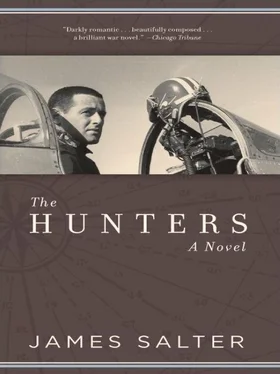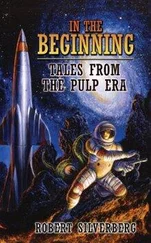“Oh, sure. He was good. The big thing, though, was that little extra courage and pride. That’s what makes the difference.”
“I suppose so.”
“I know it,” Imil emphasized. He paused. “Sometimes the ones who’ve got it don’t realize how important they are, how much things depend on having enough men with just that little more. I mean it, Cleve.”
“Yes, sir.”
The colonel stood there reflectively, rapping the counter lightly with his knuckles. Suddenly the radio began again. Moncavage’s voice was recognizable. The first flights were heading back. Imil listened for a minute and then picked up the microphone and called.
“Go ahead. This is Red Leader,” Moncavage replied.
“Hey, Monk, this is Dutch. How’d you make out?”
“Say again.”
“This is Dutch, Monk. How many did you get?”
“Four, I think,” Moncavage said.
“Who got them?”
“I don’t know yet. Not me, anyway.”
Cleve stared at the floor. He heard the colonel put the microphone down.
“They got four,” he announced happily to the intelligence and weather officers who stood in the doorway, the clerks behind them.
“They’ll be getting back in about twenty minutes,” the colonel continued, looking at Cleve. “Let’s go out and watch them land.”
They drove out to the runway and parked beside the control truck. They did not have long to wait. Soon afterward, the first ships began to return and enter the landing pattern. Cleve watched them streaking in on the initial approach against a background of pearl-shell clouds that seemed to accelerate them, like trout crossing a bright brook bottom. They were all elements of two, with occasional singles. As they came in over the end of the runway to land, the dust puffed up behind them. He looked closely when they swept by him, reared with their nose gears still held off the ground. He did not see many that had fired. He listened and watched for his own flight as more and more ships appeared, school-like, around the field. Finally, he heard them. They had been split up like the rest. Daughters and Pell came in first. They broke almost directly overhead. He watched them fly the pattern. Their gear came down. They turned onto the base leg. Then they were banking steeply on the final turn and dropping fast. One close behind the other they settled in on the runway. Cleve could see it from far off. It was as if he had known beforehand that it would be. Pell’s gun ports were carbon black.
It was true. When they drove in after the last ships had landed, they heard that Pell had gotten another MIG. He had seen it, very low, heading along the Yalu on the deck. He’d called it out to Daughters, but Daughters had not been able to spot it and told Pell to take it. Pell did, going down all the way from thirty-five thousand feet. At the last minute, he saw there were two MIGs and that he had misjudged and was going to overshoot; so he’d started firing from far out of range, holding the trigger down as he closed, and had managed to spray in enough hits so that the pilot ejected himself just as they flashed past.
“Pell got another one,” Colonel Imil said. “That boy must be really hot. He’s the one in your flight, Cleve, isn’t he?”
“Yes, sir.”
“He’s a comer. He’ll be one of our next aces.”
Cleve said nothing. He was experiencing a sense of imprisonment. He felt a deep yearning to be outside, where he would not have to hear about it.
Desmond had been on the mission, too.
“What do you think of your boy now?” he asked Cleve.
“Pell?”
“I told you he was going to be good. Remember?”
“I remember, all right.”
“He did a fine job this morning.”
“Yes,” Cleve said. “He can fly. I may be wrong about the rest.”
“I think you are.”
“We’ll see. It won’t be the first time.”
He walked to where his flight stood around a table, giving its account of the mission.
“Hey, Cleve,” Pell grinned, “you missed a good one. You should have come along.”
Cleve did not answer. He took Daughters aside.
“How did it happen?” he asked.
He wanted to hear a first-hand account. Daughters told him the same story he had heard already.
“I don’t know how he ever spotted him,” Daughters admitted. “We were down to twenty thousand before I saw him. That Pell has a pair of eyes.”
It came to that, time after time, who could see the farthest. Cleve was determined not to submit to it. He argued automatically: “He might have caught a flash of sun on him.”
“I don’t think so, Cleve. I believe he can see a bird’s nest from forty thousand. I really do.”
The furor of debriefing was at its peak. It had been a big morning, and excitement ran high. Everybody was anxious to find out the details of what had happened, or to make their claims. Shouted congratulations crossed the room. It turned out, when the fragments of the fight had been consolidated, that five MIGs had been downed altogether. The reconnaissance ship had not gotten its photographs. The enemy had been up in such strength that Colonel Moncavage had ordered the photo ship to turn back; but it had been a great victory, despite the abandonment of the original mission. Five kills and no losses. Cleve stood listening to the undercurrent. Everybody was talking about Pell: a second lieutenant, a wingman, with two kills. It was an extraordinary achievement.
“It had to be him,” DeLeo said mournfully. “Christ. Now we suffer.”
“Daughters thought he was pretty good,” Cleve said.
“Daughters is probably covering up for him.”
“He’s not. I talked to him.”
“Just between us,” DeLeo said, “Jim is a fine type, but he ought to be back teaching school somewhere. I know Pell. I’ve seen dozens like him. The wise ones. Where I come from, they end up in alleys, on their faces. Either the cops or the big boys take care of them. Pell’s one. You’re not going to change that.”
“How about giving him half a chance, Bert?”
“I already have.”
Cleve smiled mirthlessly.
“You’re a tough one,” he said.
In the mess hall that noon, Pell sat with Hunter and Pettibone, telling them about the fight. They listened absorbed. They were not eating, but Pell was, hungrily, as he described the action.
“I was lucky as hell,” he said confidentially. “That pass I made on him: tom. Strictly tom. If I hadn’t gotten him that first time, either he or his wingman would probably have gotten me. I really hit him good, though. You should have seen the flashes. He lit up all over. Then, just as I went by him, pouf!”
Pell exploded his fist into fingers. That was the pilot going out.
“That was good shooting, Doctor,” Hunter said.
Pell flicked his hand in a dispelling gesture to show how difficult it had been.
“I just hosed him from three thousand feet all the way in,” he explained. “I was closing too fast to do anything else. I can’t wait to see the film, though. If it comes out, it’ll be terrific. I told those boys in the photo lab to take special care of it.”
“How come Daughters didn’t get the second MIG?”
“Daughters?” Pell laughed. “He’s lucky it didn’t get him.”
Throughout the meal they were stopping at the table to say something to Pell, to pay their respects. Many of them were merely curious, and a few were seeing Pell for the first time. It was not a ritual, but there was a certain formality involved. The words were always the same. The tone was reserved. Hunter and Pettibone sat quietly through it, watching with envy and also—they could not resist it—pride. They were wingmen together, in the same flight. Regardless of what happened, he was one of them, and he had shown them hope.
Читать дальше












